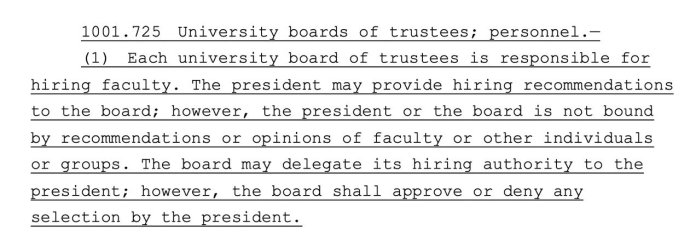Note: This is an adjusted version of commentary from the March 17th episode of HBCU Pulse Radio on SiriusXM. Listen to the full commentary on Friday, March 17th at 5 PM EST/4 PM CST and on HBCU Pulse YouTube and podcast outlets.
Florida Governor Ron DeSantis has waged a war on diversity, equity and inclusion initiatives at the state’s public higher education institutions. Last July, I wrote an article on HBCU Pulse doing a deep dive on the “Stop W.O.K.E Act” and how he wants to use this law to take control of Florida’s public colleges and universities. “W.O.K.E” stands for “Stop the Wrongs to Our Kids and Employees” and his goal is to “prevent Florida tax dollars to be spent teaching kids to hate our country or to hate each other.” In my article from last summer I spoke about draft legislation that was uncovered by independent journalist Jason Garcia that put a large amount of power in the hands of DeSantis and his political appointees.
I spoke about this draft legislation and how it would allow the state legislature to veto proposed budgets and even cut funding if the state deems the public university isn’t following their outlined rules. The most alarming part I found in the draft legislation is that it strips power from the presidents of public colleges and universities in Florida and grant the Board Of Trustees for these institutions the power to hire and fire professors.

This is concerning because the state government already has oversight of Florida public college and university board of trustees. Although each institution has their own board of trustees, these Boards are under the jurisdiction of a statewide board of governors where DeSantis appoints 14 of the 17 members. So, taking power from the president for key university functions effectively would allow DeSantis control of the functions of those colleges and universities.
Well, now the “draft legislation” looks to now be set to turn into law. House Bill 999, if passed, would take effect July 1st. It seems as if DeSantis can’t wait for the bill to pass like a kid on Christmas Eve that can’t with to open their presents. DeSantis recently appoint six new members to the thirteen member Board Of Trustees at liberal arts institution New College Of Florida. Immediately after the new Board of Trustee members were named, they fired New College’s president Patricia Okker. Chris Rufo, one of DeSantis’s appointees to the Board Of Trustees, said that there would be a “top down restructuring” and that a new curriculum would be created from scratch. The board just recently voted to abolish the Diversity, Equity & Inclusion office.
Hundreds of New College of Florida students have protested these moves by the board. An op-ed in Teen Vogue by two New College of Florida professors says that “What the DeSantis administration is trying to do, in brief, is force a conservative Christian model of education onto our public college, attempting to choke out hard-won academic freedom.” This, admittedly, is frightening. Leaders using their political power to take control of a public institution is something I never would’ve imagined. However, we’re here. And we now need to stay focused on what the possible passage of House Bill 999 could mean for Florida A&M Univeristy, the only public HBCU in the state of Florida.
Now, let me be clear. There is nothing overtly that says that FAMU will be targeted. I’m confident in FAMU alumni and student’s ability to mobilize politically to stop any rash actions by the State, just as they did to stop talks of the merger with Flordia State in 1967. Also, several portions of the S.T.O.P Woke Act was blocked last November and House Bill 999 could be subjected to that same action as well if passed. But, this is a concerning trend that is worth note. The fact that our public HBCUs are vulnerable to political attacks due to our historical mission to uplift black students scares me. What scares me even more is that it seems as if we can’t prevent what could possibly come.
But, we can’t stop our fight. We have to continue to advocate and shed light on whats happening. There’s power in our voice and there’s power in bringing attention to affronts on the sustainability of our institutions. And, more than anything, this has to be our wake-up call to vote in local and state elections. We have to put leaders in office that can properly advocate for our issues and always act in the interests of the people.













